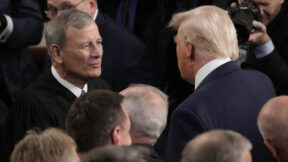‘I Hate My Opponent!’ Trump’s Crack Undermines Erika Kirk’s Stunning Forgiveness at Charlie Kirk Memorial
At Charlie Kirk’s memorial service, his widow, Erika, stunned mourners — and a deeply divided nation — by publicly forgiving her husband’s assassin. But the solemn moment was soon undercut when President Donald Trump, speaking at the same event, veered off script to joke that, unlike Kirk, he “hates” his opponents. The crowd laughed, but the remark underscored just how quickly grace can be drowned out by grievance.
Erika Kirk did more than give a eulogy. It was a radical public act. In an age when every grievance is amplified and monetized, forgiveness is a scarce resource. And yet, Erika offered it freely. For a brief spell, the spectacle of politics gave way to something elemental — an ethic rooted in faith, yes, but also in an understanding that vengeance never heals. Across the spectrum, from Fox News to MSNBC, her words drew praise. For once, there was consensus: what we had just witnessed mattered.
Then Donald Trump spoke.
Reading from prepared remarks, he began in a somber register, noting that Charlie “did not hate his opponents” and even “wanted the best for them.” But Trump could not resist breaking script. With a smile, he told the audience that this is where he and Charlie differed. “I hate my opponent,” he said. “And I don’t want the best for them, I am sorry. I am sorry Erika. But now Erika can talk to me in the whole group and maybe they can convince me that’s not right. But I cannot stand my opponent. [Laughter].”
The crowd’s reaction told the story.
Trump’s aside can, of course, be dismissed as a joke — one of the many knowing provocations that animate his political style. But many truths are told in jest, and this one was blunt: a sitting president declaring, before a grieving widow, that hatred is his political motor.
The sharper point, though, is not that Trump said it. It’s that the crowd seemed to eat it up. That the room, which had just borne witness to an act of extraordinary grace, opted to relax into the easier pleasure of mockery. Erika Kirk’s forgiveness was hard, costly, and vulnerable. Trump’s crack was cheap, cathartic, and familiar. One offered a path forward; the other offered the comfort of the rut we already occupy.
That is the Rorschach test of our moment. When given the choice between grace and grievance, between the transcendent and the transactional, we keep picking grievance. The laughter wasn’t malicious — it was recognition, a nod to the bitterness so many carry. But it also revealed how much we’ve normalized that bitterness, how reflexively we reach for it even in spaces that call for something higher.
Erika Kirk showed us what moral leadership can look like: forgiving the unforgivable. In a nation teetering on the brink of civil conflict, her example should have been a touchstone. Instead, it was undermined by a line that confirmed what too many already believe: that hatred is politics’ natural state.
We didn’t just learn something about Trump at that memorial service. We were reminded of something about ourselves. Given a chance to elevate forgiveness, we tittered at a performative hate jibe instead. And that may be the most sobering truth of all.
Watch above via Fox News.
This is an opinion piece. The views expressed in this article are those of just the author.




